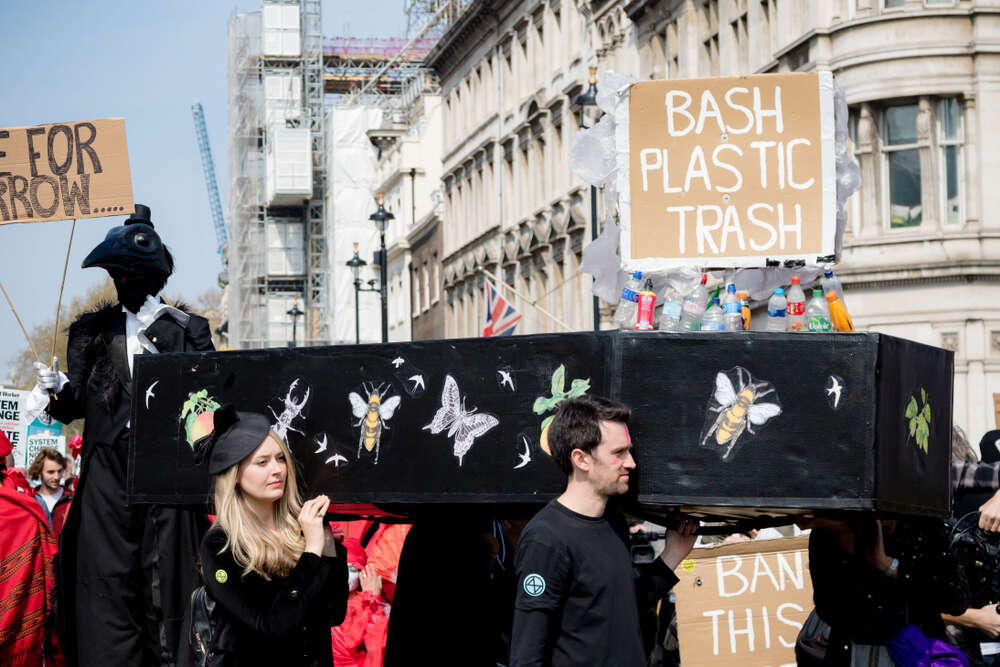
- The new draft framework from the Taskforce on Nature-related Financial Disclosures (TNFD) on biodiversity risks has been criticised for failing to address greenwashing.
- Only 25% of asset managers have commitments to deforestation, and none have commitments to avoid other forms of damage to natural habitats, according to ShareAction.
- Sustainability/ESG funds at BlackRock, Vanguard and State Street Global Advisors vote against biodiversity 80–100% of the time.
The humour used to celebrate World Environment Day on 5 June was bleak.
The Australian sustainable packaging company Better Packaging plopped a 4m-high sculpture of a poo made from recycled waste plastics on Bondi Beach to draw attention to the amount of plastic dumped in the world’s oceans.
The fight for biodiversity to get attention is raging. On 1 June, 62 civil society organisations and networks sent an open letter to the Taskforce on Nature-related Financial Disclosures (TNFD) to highlight that its draft framework for companies and financial institutions to report on their biodiversity risks and opportunities fails to address greenwashing.
The letter was timed to align with the closing of the international task force’s feedback process on 1 June but before it releases its final framework in September.
The main complaints were TNFD’s reports will not have to include information on which companies are facing allegations of harming biodiversity; the data in reports will be unverifiable; and companies will not need to report their lobbying against laws that help protect nature.
The framework speaks of disclosure rather than the actual changes that are needed, according to Osprey Orielle Lake, executive director of the Vancouver-based advocacy group Women’s Earth and Climate Action Network.
“It says nothing about corporations needing to stop financing fossil fuels, to stop deforestation, to stop dangerous experiments like deep seabed mining. It does not include the knowledge and rights of Indigenous peoples, women and communities at the forefront of biodiversity protection,” she says.
A shoddy approach to sustainability
As Capital Monitor reported in December, despite setting public targets, nearly three-quarters (70%) of companies are not measuring the impact of their value chain on biodiversity.
Not great news, but corporations still do not seem to be getting any kind of push from investors.
A survey published this week by London-based investment lobbyist ShareAction found only a quarter of asset managers have commitments to deforestation, and none have commitments to avoid other forms of damage to natural habitats, such as wetland draining for agricultural use or ocean pollution. Indeed, almost a third of respondents are yet to assess biodiversity risks at all [see chart].
“It is alarming to see too many asset managers are failing to adapt their investments,” says Claudia Gray, ShareAction’s head of financial sector standards.
The survey looked at 77 of the world’s largest asset managers with $77.6trn assets under management (AUM). Asset managers are collecting the data but are simply not acting on it. Most managers (70%) perform climate scenario analysis, yet less than a third (32%) say that they use these results to inform their approach to investment.
“This calls into question whether asset managers are sufficiently considering financially material risks and, by doing so, fulfilling their fiduciary duty,” the report says. A sign of how shoddy their approach to sustainability is can be seen in how they treat net zero.
Although more than four out of five (82%) asset managers now plan to be at net zero by 2050, these pledges are barely worth the paper they are printed on.
“Some of the targets feature wording which falls short of making a clear commitment, lack credible accompanying plans for how the targets will be achieved, or otherwise preclude the possibility of increasing their commitment to cover 100% of their AUM over time,” the report says.
The net-zero targets of Vanguard ($7.2trn AUM) – the asset management industry’s Lord Voldemort – for example, only applies to 17% of its AUM. As usual, it hides behind the excuse of its predominantly passive investment model.
Actively harming biodiversity
But while the ShareAction survey finds an industry that is dragging its heels on change, a survey at the end of May from London-based non-profit financial think tank Planet Tracker painted the picture of an asset management industry actively doing harm.
Looking at 26,500 votes by over 7,700 funds on biodiversity proposals, it found the majority (54%) voted against and almost two-thirds (62%) of votes were cast against or not voted on.
More to the point, analysis into sustainability/ESG funds at the world’s largest asset managers including BlackRock, Vanguard and State Street Global Advisors showed that even they are voting against biodiversity 80–100% of the time.
“With asset managers favouring engagement over divestment as an approach in transforming corporate behaviour, funds must step up and support important biodiversity proposals, or provide justification for their voting decision,” says John Willis, director of research at Planet Tracker.
Take BlackRock ($10trn AUM) for example. It talks a good game. Its proxy voting guidelines state that “well-run companies, where appropriate, effectively evaluate and manage material sustainability-related risks and opportunities as a core component of their long-term value creation”.
While the firm’s nine sustainability/ESG funds have almost always voted in support of biodiversity proposals, its 309 other funds vote against them more than three-quarters of the time.
At Vanguard, both the group’s 11 sustainability/ESG funds and its 146 other funds generally vote against biodiversity proposals, as do State Street Global Advisors’ ($3.5trn AUM) three sustainability/ESG funds and its 125 other funds.
While the big three have not given their reasons for voting against biodiversity proposals, others did. Some (33 funds) described the proposal as “overly prescriptive”, 32 funds said that the firms already reported on biodiversity, and 31 said that there were insufficient shareholder benefits.
With that little commitment from investors and dragging feet from companies, it's little wonder that the pace of change is so slow.
[Read more: Committing to biodiversity easier than acting on it: New research]



